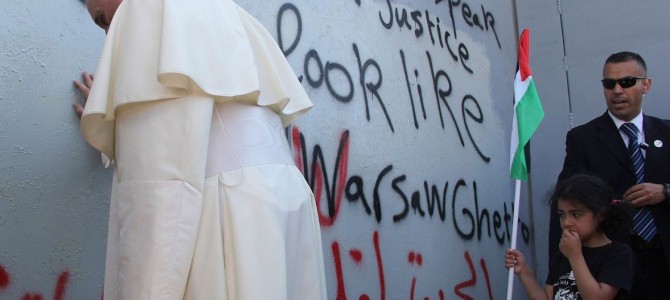
This week the Vatican officially recognized the “state of Palestine.” Which is weird, because it doesn’t exist.
One of the strategic goals of Palestinian leadership has been to convince as many nations, governments and institutions as it can to endorse a fictional “state” to create a sense of inevitability that will pressure Israel into acquiescence. And while the United Nations or certain European governments are perfunctorily anti-Zionist (or worse), the Pope yields far too much moral authority to be similarly dismissed.
The Catholic Church’s favorable feelings towards Palestinian aspirations is not new. In 2000, and many times afterwards, Pope John Paul II met with Yasser Arafat, a man only noteworthy for targeting civilians around the world (even before 1967). But, to be fair, the Pope’s initial blessing to Palestinian ambitions was at a time many believed that Arabs and Israelis were on the cusp of a historic peace accord. In that context, John Paul II efforts made some moral sense.
The same can’t be said of Pope Francis’ declaration. Not after the many times Palestinian leadership failed its own people. In this context, at this point in history, recognition of a Palestinian State without any preconditions isn’t just antagonist towards Israel, and millions of Jews, but devoid of any tangible political upside.
The Vatican already supported the decision of the U.N. General Assembly to recognize a Palestinian state in 2012. During Pope Francis’ visit to Israel in 2014, he referred to Abbas as the president of the “state of Palestine.” (The two, incidentally, met at the official PLO residence in Bethlehem, which was once a Greek Orthodox monastery next to the Church of the Nativity taken by the PLO for its own use.) And in the Vatican’s yearbook, the Palestinian ambassador is listed as representing “Palestine (state of).”
“Yes, it’s a recognition that the state exists,” a Vatican spokesman, Rev. Federico Lombardi, explained.
I leave the topic of the Pope’s ecclesiastical jurisdiction to others, but I do wonder where he derives the authority to claim that a country exists that has never existed in any legal, ethnic or national sense. A state is a territory with defined borders and run by organized political community under an independent government. They may be such an Arab state in the West Bank and Gaza one day, but to this point, under the rule of Israel, Jordan, Egypt, the Ottomans, the English, and so on, there has never been one.
Has the Pope contemplated where this state’s borders will begin and end? Or is it whatever Abbas says it is? Has the Pope thought about what happens if Hamas wins elections (should they ever happen) and begins targeting Christians and Jews? The Vatican, expecting nothing, no assurances from the Palestinians about terrorism or its treatment of minorities, endorses its existence. What the Palestinians learn from this is that if you’re violent enough, for long enough, you will garner attention and support – something the Kurds, or Basques or hundreds of others of ethnic minorities haven’t learned.
Moreover, every time Abbas obtains one of these moral victory – because that’s all they are – he likely be less inclined to negotiate with the only institution that can actually offer him a state. Jonathan Tobin lays this point out well over at Commentary:
The Palestinian campaign to get recognition from the United Nations and other countries is motivated by a desire to avoid peace talks, not to make them more successful. The Palestinians want a state but not one that is prepared to recognize the legitimacy of a Jewish state alongside it, not matter where its borders are drawn. By telling the Palestinians, the Church recognizes his faux state; it is making it easier for Abbas to refuse to negotiate. To the extent that this recognition grants the Palestinians rights to all of the disputed 1967 territories, the Vatican and other European states that have done the same thing, is prejudging negotiations that should be conducted by the parties, not outsiders.
Now perhaps, as some have argued, the Vatican is merely trying to improve relations with Arab nations to help mitigate the plight of Christians in the Muslim World. Though Palestinian Christians – who have no love for Israel – are one of the populations that have been systematically pushed from the Middle East by Muslims, this makes some sense. (Though, only a month ago, Pope Francis sparked some Muslim anger when he had the temerity to use the word “genocide” to refer to the genocide of Christians Armenians in the Ottoman Empire.)
But there are Jews there, as well. And I guess there is no need to rehash the complicated relationship between Jews and Catholics. The Second Vatican Council rejected anti-Judaism, replacement theology, etc… But the fact remains that the Catholic Church did not formally recognized Israel until 1993 – nearly five decades after the Holocaust ended. In this context it’s worth also noting that the actual state of Israel and the Vatican are still, after decades, negotiating an accord that governs the status of the Catholic Churches, the issue of sovereignty, taxation and expropriation. The same agreement imaginary Palestine was offered.
The Palestinian agreement “deals with essential aspects of the life and activity of the Catholic Church in Palestine,” a Vatican statement explains. And as innocuous as this sounds, and perhaps as innocuous as this is in practice, The Pope’s endorsement of a Palestinians State will surely be used for propaganda purposes. A cudgel against Israel. It might turn some former allies against the Jewish State. It may embolden Palestinians –including Hamas. It may help solidify Fatah’s position. But what it won’t change is the fundamental problem standing in the way of a two-state solution: Palestinians refuse to make the concessions and internal changes necessary to have their own state.









